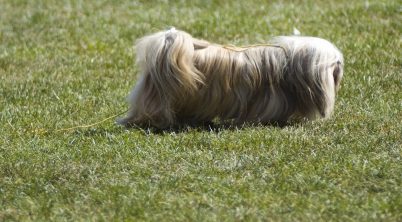Pekingese dogs are a breed with a regal history, originally bred for the Imperial Chinese Court, and they are known for their distinctive physical characteristics and bold personality. Part of their spirited nature includes a proclivity for vocalization. Barking in Pekingese can become a noticeable behavior that owners may seek to understand and manage effectively.
Understanding why a Pekingese barks is essential for addressing the issue. Barking can be a manifestation of various underlying causes such as boredom, anxiety, territorial instincts, or a desire for attention. Identifying what triggers the barking behavior in your Pekingese is a critical first step towards finding a solution.
Behavior modification techniques are essential in managing barking in Pekingese. Once the triggers are identified, owners can employ strategies to mitigate excessive barking. This might include positive reinforcement for quiet behavior, changes to the environment to reduce stress triggers, and providing adequate mental and physical stimulation to prevent boredom-induced barking. With consistent training and patience, owners can help their Pekingese express their vocal nature in a more controlled and acceptable manner.
Understanding Pekingese Barking Behavior
Pekingese barking behavior is reflective of their temperament and environment. Recognizing the triggers and underlying causes can assist owners in addressing and managing their canine’s vocal tendencies.
Common Triggers of Barking
- External Stimuli: Pekingeses may bark in reaction to various stimuli such as loud noises, the presence of strangers, or other dogs.
- Environmental Changes: Introduction to new environments or changes within their familiar setting can provoke barking as a response to uncertainty or excitement.
Pekingese Temperament and Barking Tendencies
- Inherent Traits: As a breed, Pekingeses are known to be alert and sometimes territorial. Their inherent protective nature can lead to barking when they perceive a threat.
- Independence: This breed’s independent streak can contribute to a stubbornness that manifests in barking when they try to communicate or assert themselves.
Behavioral Causes for Excessive Barking
- Anxiety or Boredom: Pekingeses might bark excessively due to anxiety or if they are not sufficiently stimulated mentally or physically.
- Seeking Attention: If they learn that barking results in attention from their owners, they may bark more frequently to elicit that response.
By understanding these aspects of Pekingese barking behavior, owners can tailor their approach to training and managing their pets effectively.
Effective Training Methods for Pekingese
Training a Pekingese requires patience and understanding of the breed’s characteristics. These small dogs possess a regal bearing and are known for their independent nature, which can pose challenges in training. However, effective methods tailored to their specific needs can lead to successful training outcomes.
Basics of Pekingese Training
The key to effective Pekingese training lies in understanding their temperament and establishing clear, consistent rules. Pekingese can be stubborn, so it’s crucial to start training early, remain patient, and keep sessions short to maintain their attention. A typical training session should involve:
- Consistency: Stick to the same commands and rules every time.
- Patience: Allow the Pekingese time to understand and follow the commands.
- Brief Sessions: Limit training to avoid overstimulation and keep a positive association.
Positive Reinforcement Techniques
Positive reinforcement strengthens desired behavior by rewarding it immediately when it occurs. For Pekingese training, this method proves especially effective:
- Rewards: Include treats, praise, or toys after the Pekingese performs a command correctly.
- Timing: Immediate rewards help the dog associate the behavior with the reward.
- Frequency: Initially reward every success, then gradually reduce the frequency to encourage consistent behavior without continuous treats.
Addressing Barking with Training
Barking is a common issue in Pekingese due to their alert nature. Effective training methods to address barking include:
- Command Training: Teach commands such as “Quiet” in a calm, firm tone.
- Diversion: Redirect attention to a toy or activity when barking is inappropriate.
- Environment: Minimize exposure to stimuli that trigger barking, such as noisy environments or strangers passing by.
Using these targeted training methods will help address the specific challenges of teaching obedience and managing behavior in Pekingese, leading to a well-trained, happier dog.
Physical and Mental Stimulation Needs
Pekingese dogs require a balanced combination of physical exercise and mental stimulation to prevent excessive barking. These activities not only keep them physically fit but also ensure their mental well-being.
Importance of Exercise and Activity
Exercise is vital for Pekingese dogs to maintain their health and curb unwanted behaviors like excessive barking. Regular physical activity such as:
- Daily walks: At least two 15-minute walks per day.
- Structured play sessions: Engage in play that stimulates their natural playfulness.
These activities provide an outlet for pent-up energy and can significantly reduce stress-induced behaviors.
Toys and Mental Stimulation for Pekingese
Mental stimulation can be just as important as physical exercise for a Pekingese. It keeps their mind sharp and engaged, leading to a more content and quieter dog. To provide mental stimulation:
- Use toys designed to challenge their intellect, like puzzle feeders.
- Ensure regular attention and interaction through training sessions or games like hide and seek.
These methods promote mental activity, preventing boredom and the excessive barking that often accompanies it.
Socialization and Environmental Factors
The barking behavior of Pekingese can be significantly influenced by their socialization experiences and the environment they are exposed to. Proper socialization can mitigate barking issues, while environmental factors like noise may exacerbate them.
Interactions with Other Dogs and Pets
Pekingese may engage in excessive barking when around other dogs and pets due to inadequate socialization. Social dogs that have positive experiences with a variety of companions tend to exhibit less problematic barking. Encouraging interactions in controlled settings ensures that a Pekingese learns to communicate effectively without resorting to continuous barking.
The Role of Socialization in Barking Reduction
Socialization plays a pivotal role in a Pekingese’s behavioral development. By exposing them to various scenarios and beings, including other dogs and pets, they become more adaptable and less likely to bark excessively. Pekingese puppies between three weeks and four months of age are especially receptive to socialization, setting the tone for their future responses to their environment.
Effects of Noise and Crowd on Pekingese Barking
Pekingese can be sensitive to environmental stimuli such as loud noises or crowded places. Barking is a common reaction to such stressors, which can be mitigated by gradually acclimating them to different environments. This process encourages the Pekingese to remain calm and restrained in the face of potential triggers.
Health and Wellness Considerations
When addressing the barking habits of Pekingese dogs, it’s crucial to consider underlying health issues, the impact of diet on behavior, and how grooming and dental care can influence temperament.
Identifying Health Issues Behind Excessive Barking
Excessive barking in Pekingese may sometimes be a sign of underlying health conditions. Health problems such as skin infections, which may cause discomfort, or breathing problems due to their shortened snouts could lead to increased barking as a symptom of distress. Owners should monitor for other signs of health issues, such as changes in eating habits or the development of eye problems, and consult a veterinarian to ascertain the cause and appropriate treatment.
Dietary Impact on Behavior
A Pekingese’s diet can significantly affect their behavior. Foods high in artificial additives may contribute to hyperactivity or irritability, leading to excessive barking. It is important to provide a balanced diet rich in nutrients which can promote a calm demeanor. Regular, measured feeding times can also help reduce anxiety and the resulting barking episodes that may arise from hunger or digestive discomfort.
Grooming and Dental Care Influence
Regular grooming sessions are not only essential for maintaining the Pekingese’s long coat but also for identifying any potential health issues such as skin infections that might cause irritability and barking. Moreover, due to their crowded teeth, Pekingese are prone to dental care issues. Effective dental hygiene practices can prevent discomfort that might lead to excessive barking. It’s important for owners to establish a routine that includes teeth cleaning to help manage dental health.
* Banner by Agnieszka Lublin, cropped | Some rights reserved








